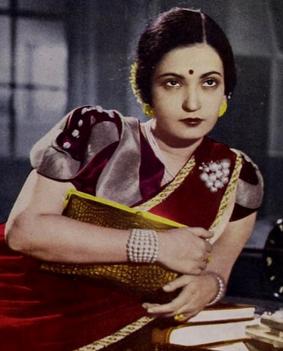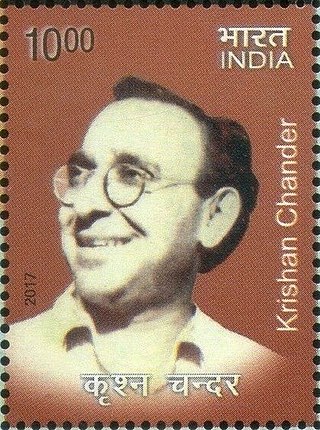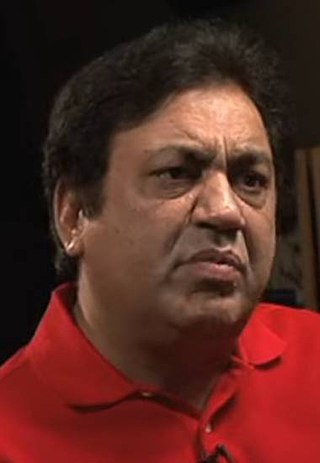
Awadh, known in British historical texts as Avadh or Oudh, is a historical region in northern India, now constituting the northeastern portion of Uttar Pradesh. It is roughly synonymous with the ancient Kosala region of Hindu, Buddhist, and Jain scriptures.
A tawaif was a highly successful entertainer who catered to the nobility of the Indian subcontinent, particularly during the Mughal era. The tawaifs excelled in and contributed to music, dance (mujra), theatre, and the Urdu literary tradition, and were considered an authority on etiquette. Tawaifs were largely a North Indian institution central to Mughal court culture from the 16th century onwards and became even more prominent with the weakening of Mughal rule in the mid-18th century. They contributed significantly to the continuation of traditional dance and music forms and then to the emergence of modern Indian cinema.

Faizabad is a city in the Indian state of Uttar Pradesh. Faizabad and the neighbouring city of Ayodhya are administered by Ayodhya Municipal Corporation. It was the headquarters of Faizabad district and Faizabad division. On 6 November 2018 the Uttar Pradesh cabinet headed by chief minister Yogi Adityanath approved the renaming of Faizabad district as Ayodhya district and Faizabad division as Ayodhya division. Faizabad is situated on southern the bank of the River Saryu about 130 km east of state capital Lucknow. It was the first capital of the Nawabs of Awadh and has monuments built by the Nawabs, like the Tomb of Bahu Begum, Gulab Bari.

Grand Ayatollah Syed Ali Naqi Naqvi (born 26 December 1905 – 18 May 1988), also known as Naqqan Sahib, was a Twelver Shia Marja, thinker, poet, writer, jurist and Qur'anic interpreter. He is famous for his writings in Urdu, including the most famous Shaheed-e-Insaniyat and Tareekh-e-Islam. He has also written Tarjuma wa Tafseer of Quran e majeed and dozens of books in Arabic.

Akhtari Bai Faizabadi, also known as Begum Akhtar, was an Indian singer and actress. Dubbed "Mallika-e-Ghazal", she is regarded as one of the greatest singers of ghazal, dadra, and thumri genres of Hindustani classical music.

Roshan Lal Nagrath, better known by his first name Roshan, was an Indian esraj player and music director. He was the father of the actor and film director Rakesh Roshan and music director Rajesh Roshan and paternal grandfather of Hrithik Roshan.

Begum Hazrat Mahal, also known as the Begum of Awadh, was the second wife of Nawab of Awadh Wajid Ali Shah, and the regent of Awadh in 1857–1858. She is known for the leading role she had in the rebellion against the British East India Company during the Indian Rebellion of 1857.

Abdul Hayee, popularly known by his pen name (takhallus) Sahir Ludhianvi, was an Indian poet and film song lyricist who wrote primarily in Urdu in addition to Hindi. He is regarded one of the greatest and revolutionary film lyricist and poet of the 20th century India.

Krishan Chander was an Indian Urdu and Hindi writer of short stories and novels. Some of his works have also been translated in English. He was a prolific writer, penning over 20 novels, 30 collections of short stories and scores of radio plays in Urdu, and later, after partition in 1947, took to writing in Hindi as well. He also wrote screen-plays for Bollywood movies to supplement his meagre income as an author of satirical stories. Krishan Chander's novels have been translated into over 16 Indian languages and some foreign languages, including English.

Sohail Ahmed, also known as Azizi, is a Pakistani actor, comedian and director.

Amritlal Nagar was one of the prominent Hindi writers of the twentieth century.
Dr. Yogesh Praveen was an Indian author and expert on the history and culture of Avadh, specifically Lucknow. He had a Masters in Hindi and Sanskrit in addition to a doctorate in Literature from Meerut University.

Birjis Qadr was the Nawab of Awadh from 1857 until 1858.

Local tradition holds Fyzabad or now Faizabad is identical with the Saket of the Ramayana, supposedly the private estate of King Dasharatha, father of Lord Rama. It is claimed that Saket was renamed after the death of Faiz Baksh, a courtier of the Nawab of Awadh. Historically, when Nawab Saadat Ali Khan, Burhan-ul-Mulk was given the charge of the Subah of Awadh around 1722 by the Mughal court, he settled on the banks of the river Ghaghara, building a fortress and mud barracks. Due to these temporary dwellings, the settlement was initially referred to as 'Bangla'.
Syed Waheed Ashraf is an Indian Sufi scholar and poet in Persian and Urdu. Ashraf received his B.A., M.A. and PhD (1965) degrees from Aligarh Muslim University. The title of his doctoral dissertation was A Critical Edition of Lataife Ashrafi. After serving at a number of Indian universities, Ashraf retired as head of the department of Arabic, Persian and Urdu at the University of Madras in 1993. Fluent in seven languages, he writes in Urdu, Persian and English, has written, edited or compiled over 35 books. Ashraf has focused on upholding and propagating the principles and practices of Sufism.
V. Balaji is an Indian violinist who performs both Hindustani classical music and Carnatic music. Presently he is a Professor of Violin at Banaras Hindu University, eventually became the Head and the Dean of the Instrumental department.

Uda Devi Pasi was an Indian women freedom fighter who participated in the war on behalf of Indian soldiers against the British East India Company, during the Indian Rebellion of 1857. She was a member of the women's squad of Wajid Ali Shah, the sixth Nawab of Awadh.

Puru Dadheech is a Kathak dancer. He is a choreographer and educator of Indian classical dance, and is known for his pioneering work in the field of Kathak. At the oldest Kathak department which was formed in 1956 at Indira Kala Sangeet Vishwavidyalaya Public University located in Khairagarh, Puru Dadheech instated the first Kathak syllabus in 1961. He is the holder of the first Doctorate in Kathak Classical Dance and emphasizes the relevance of Shastras in the Kathak repertoire. He was awarded Padma Shri, the 4th highest civilian award of India He is currently serving as the Director of the world’s first dedicated Kathak research Centre at the Sri Sri University, Cuttack called Sri Sri Centre for Advanced Research in Kathak.

Raja Devi Bakhsh Singh was a British-era King from Gonda, Uttar Pradesh. He was born in 19th century AD. He became popular because of 1857 revolt. He is represented as symbol of communal harmony, his name and the works done by him is still highly respected in neighbouring districts. Today there are few people who know his name but at that the time of 1857 revolt, he displayed valour and bravery and even encouraged harmony between Hindu & Muslim.















